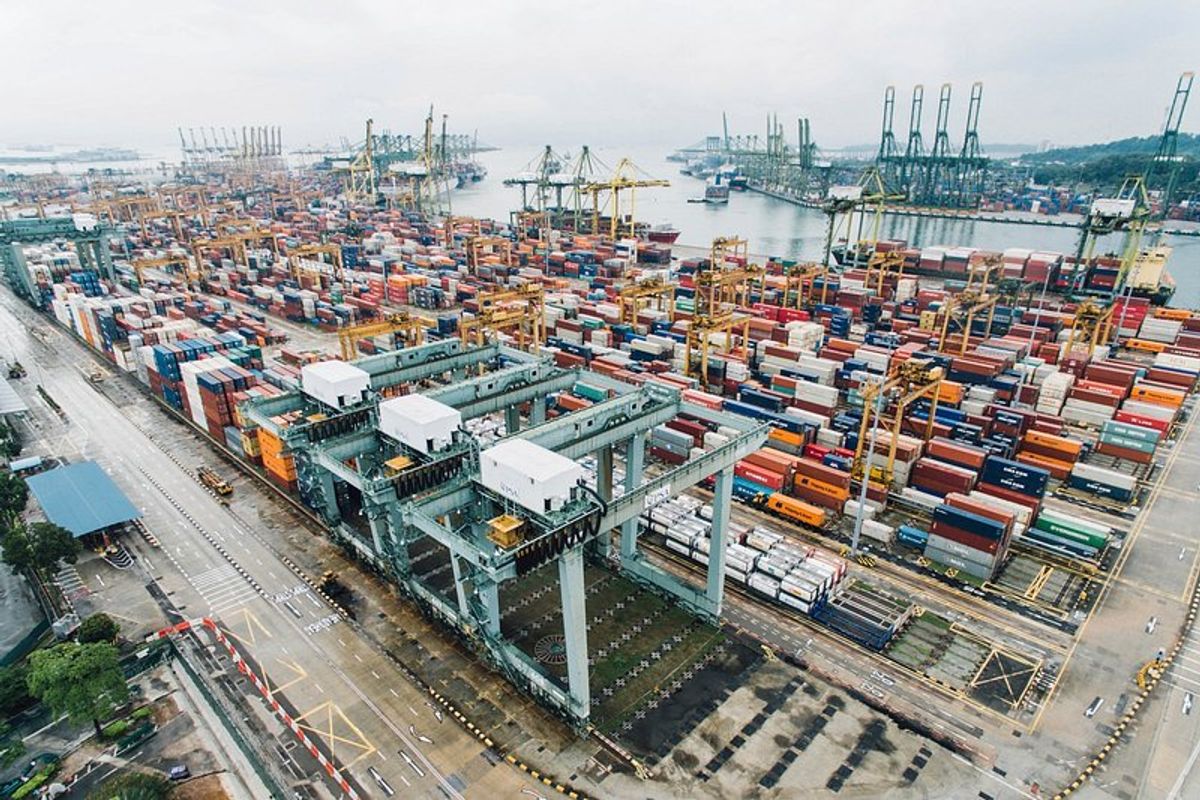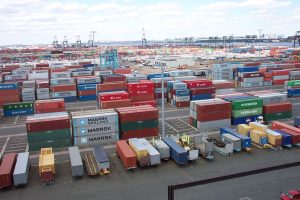In the dynamic and complex world of port logistics and shipping services, optimizing revenue recovery is crucial for sustainable growth and profitability. This article explores the challenges faced in revenue recovery, the technological solutions available, and operational strategies to enhance revenue optimization.
Key Takeaways
- Data accuracy and integrity are foundational for effective revenue recovery processes.
- Implementing automated billing systems can significantly reduce errors and streamline the invoicing process.
- Blockchain technology enhances transparency and trust in transactions, improving revenue recovery.
- AI-powered revenue forecasting enables proactive decision-making and better revenue management.
- Efficient cargo handling processes and optimized container tracking are essential for maximizing revenue recovery in port logistics.
Challenges in Revenue Recovery
Data Accuracy and Integrity
In our quest for revenue recovery, we recognize that the foundation lies in data accuracy and integrity. Without precise data, every subsequent step is compromised. We prioritize the meticulous collection and verification of data to ensure that every invoice reflects the true scope of services provided.
Accuracy in data is not just about numbers; it’s about the reliability of the information that drives our billing processes. Consider the following points:
- Ensuring data is captured correctly at the source
- Regular audits to verify data integrity
- Implementing checks and balances to prevent errors
By embedding rigorous data validation protocols, we safeguard against revenue leakage.
We’re committed to transforming data into a powerful asset for revenue recovery. This commitment extends to resolving payment disputes and collecting unpaid bills, particularly in emerging markets where challenges are most acute.
Invoice Discrepancies
We’ve all been there—scrutinizing the numbers, trying to reconcile the invoices. Invoice discrepancies are more than just a nuisance; they’re a barrier to efficient revenue recovery. The root of the problem often lies in the complexity of shipping operations and the multitude of charges involved.
- Incorrect freight rates
- Misclassification of goods
- Unapplied discounts
Each error chips away at our bottom line, demanding immediate attention and rectification.
To combat these discrepancies, we must adopt meticulous verification processes and ensure that every charge is justified and accurate. It’s a painstaking task, but essential for maintaining the integrity of our billing systems. By doing so, we safeguard our revenue and uphold the trust of our clients.
Contractual Compliance
We understand the critical role of contractual compliance in optimizing revenue recovery. Ensuring that all parties adhere to the agreed terms is not just about legality; it’s about maintaining trust and efficiency in our operations.
To tackle this, we’ve established a clear protocol:
- Regular audits of contract execution
- Swift resolution of non-compliance issues
- Continuous training for our staff on the latest regulations
By proactively managing contracts, we safeguard our revenue streams and improve cash flow. This approach is particularly effective in container shipping, where timely debt collection and dispute resolution are paramount.
In emerging markets, where the logistics landscape can be volatile, our best practices for collecting unpaid bills are more than just a necessity; they’re a strategic advantage.
Technology Solutions for Revenue Optimization
Automated Billing Systems
In the realm of port logistics and shipping services, we’ve embraced automated billing systems to revolutionize revenue recovery. These systems ensure accuracy and efficiency, eliminating human error and reducing the time between service delivery and invoicing.
Automated billing is the cornerstone of modern revenue management. It streamlines the entire billing process, from rate calculation to invoice generation. This not only speeds up cash flow but also enhances customer satisfaction by providing timely and accurate billing information.
By integrating automated billing systems, we’re able to provide real-time billing updates and detailed transaction records, which are crucial for dispute resolution and financial reporting.
- Automated rate calculation
- Real-time invoicing
- Detailed transaction records
- Quick dispute resolution
- Enhanced financial reporting
The implementation of these systems has led to a significant reduction in billing errors and an increase in the speed of revenue collection. We continue to refine our billing processes to ensure that we stay at the forefront of revenue optimization in the shipping industry.
Blockchain for Transparent Transactions
In the realm of port logistics and shipping services, we recognize the transformative power of blockchain technology. It ensures the integrity of financial transactions by providing an immutable ledger, visible to all parties involved. This transparency fosters trust and reduces the potential for disputes.
Blockchain not only streamlines billing and payment processes but also enhances security against fraud. We’re looking at a future where every charge, every fee, and every transaction is accounted for, with no room for error or misinterpretation.
By integrating blockchain, we’re paving the way for a more reliable and efficient revenue recovery system.
Here’s how blockchain integration can revolutionize our industry:
- Immutable record-keeping reduces revenue leaks.
- Smart contracts automate and enforce agreements.
- Real-time transaction visibility accelerates dispute resolution.
Embracing blockchain is not just about keeping up with technology; it’s about staying ahead in the competitive world of shipping and logistics.
AI-Powered Revenue Forecasting
We harness the power of AI to optimize delivery routes, ensuring efficiency, cost savings, and heightened customer satisfaction. This strategic approach not only streamlines operations but also significantly boosts our bottom line.
Predictive analytics is at the heart of our revenue forecasting model. By analyzing historical data and market trends, we’re able to anticipate demand and adjust our strategies accordingly.
- AI optimizes delivery routes for efficiency, cost savings, and customer satisfaction.
- Blockchain enhances supply chain transparency.
- Data analytics aids in demand forecasting.
Embracing AI-driven solutions positions us at the forefront of innovation, ready to tackle the dynamic challenges of port logistics and shipping services.
Operational Strategies for Improved Revenue Recovery
Efficient Cargo Handling Processes
In our quest to optimize revenue recovery, we recognize that efficient cargo handling processes are pivotal. By streamlining operations, we not only save time but also significantly reduce the risk of costly errors. Our focus is on precision and speed, ensuring that every container moves seamlessly from point A to B.
Automation plays a key role in enhancing efficiency. With the right systems in place, we can monitor and manage cargo with unprecedented accuracy. Consider the following steps we’ve implemented:
- Standardizing procedures across all touchpoints
- Training staff on best practices and technological tools
- Regularly maintaining and upgrading equipment
By adopting these measures, we’ve seen a marked improvement in our throughput times and a decrease in handling costs.
We also understand the importance of a robust legal framework, effective communication, and a deep understanding of the markets we operate in. These elements are crucial for resolving payment disputes and collecting unpaid bills, especially in emerging markets.
Streamlined Customs Clearance
We understand the pivotal role that customs clearance plays in revenue recovery. Efficient customs processes are essential to keep cargo moving and avoid costly delays. By streamlining these procedures, we not only expedite shipments but also significantly reduce the risk of financial losses due to demurrage and detention charges.
- Ensure accurate documentation to prevent hold-ups
- Leverage technology for pre-clearance activities
- Establish partnerships with local customs brokers for smoother operations
Streamlining customs clearance is not just about speed; it’s about creating a predictable and reliable flow of goods that supports our overall revenue recovery strategy.
Our focus on improving cash flow in container shipping is relentless. We tackle payment disputes in third-party logistics head-on and adopt best practices for collecting unpaid logistics bills, especially in emerging markets.
Optimized Container Tracking
In our quest for peak revenue recovery, we’ve honed in on optimized container tracking. Visibility is key in the labyrinth of global trade. By knowing the exact location and status of each container, we preempt delays and demurrage charges.
- Real-time GPS tracking
- Automated container status updates
- Predictive analytics for estimated arrival times
Embracing data-driven strategies ensures efficient cash flow and integrates payment systems for seamless transactions. Timely follow-ups are crucial for successful debt recovery in container shipping.
The benefits are clear: reduced detention fees, improved customer satisfaction, and a stronger bottom line. We’re not just moving containers; we’re advancing a connected ecosystem that propels our revenue recovery efforts forward.
Maximizing your revenue is crucial for the financial health of your business. At Debt Collectors International, we specialize in operational strategies that enhance your revenue recovery efforts. Our experienced team employs proven tactics to recover outstanding debts efficiently, ensuring your cash flow remains robust. Don’t let unpaid invoices drain your resources. Visit our website to learn more about our services and take the first step towards improved revenue recovery. Act now and partner with the experts in debt collection solutions.
Frequently Asked Questions
How can data accuracy and integrity impact revenue recovery in port logistics?
Data accuracy and integrity are crucial in revenue recovery as they ensure that billing and invoicing processes are based on correct information, leading to accurate revenue calculations and reduced errors.
What are the common challenges related to invoice discrepancies in port logistics revenue recovery?
Invoice discrepancies can arise from errors in billing, incorrect data entry, or miscommunication, leading to delays in revenue recognition and potential revenue loss.
How does contractual compliance affect revenue recovery in port logistics and shipping services?
Contractual compliance ensures that all parties adhere to agreed-upon terms and conditions, reducing disputes, minimizing revenue leakage, and improving overall revenue recovery.
How do automated billing systems contribute to revenue optimization in port logistics?
Automated billing systems streamline the invoicing process, reduce manual errors, speed up revenue recognition, and improve cash flow management in port logistics operations.
What role does blockchain technology play in enhancing transparency in revenue transactions within port logistics?
Blockchain technology provides a secure and transparent platform for recording and verifying transactions, ensuring data integrity, reducing fraud risks, and enhancing trust among stakeholders in revenue recovery processes.
How can AI-powered revenue forecasting benefit revenue recovery in port logistics and shipping services?
AI-powered revenue forecasting uses advanced algorithms to analyze historical data, predict revenue trends, optimize pricing strategies, and improve decision-making for maximizing revenue recovery in port logistics operations.





